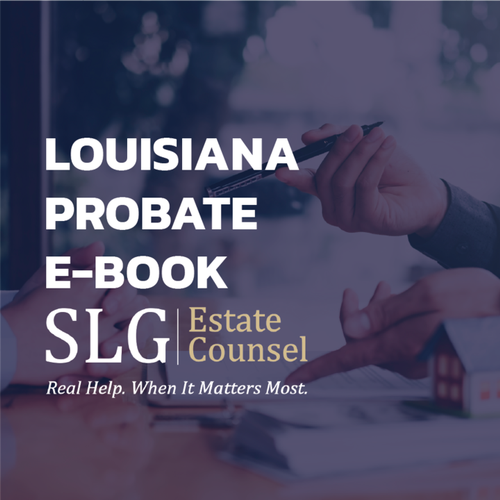When Edwin Edwards passed away last summer, he left behind an enduring legacy that some might say supersedes his politics. Edwards, who served a record-breaking 16 years as Louisiana governor, was no stranger to controversy. In office, he enraged his political rivals, who accused him of taking illegal campaign contributions and having connections to organized crime. After he retired from politics, Edwards strove to stay in the spotlight, headlining a reality television show that highlighted his unusual family life, estranged relatives, and much younger wife. 
Even in death, the late governor has continued to capture the public’s attention. Earlier this year, reports emerged that Edwards left his entire estate to his eight-year-old son. However, in spite of Edwards’ simple will, his estate remains embroiled in conflict.
The Perils of an Unprotected Estate
Governor Edwards was never a man known to spare words. In spite of his reputation as a verbose and strong-headed orator, Edwards’ handwritten will was scarcely 150 words long. In four paragraphs, the document is unambiguous, asserting that the entirety of his estate should be left to his eight-year-old son, Eli Wallace Edwards.
“I hope my other children realize that I do not love Eli more, or them less, but realize what I leave him is less than each received in money, property, homes and education,” Edwards wrote.
However, not even Edwards, who graduated law school at 21, could spare his family from one last legal scandal: less than a half-year after Edwards’ death, another of his children challenged the estate.
Edwards’ adult daughter, Victoria, said her father’s will abrogates Louisiana state law.
Louisiana’s “Forced Heir” Statute
Louisiana has long had stringent laws on inheritance. Before the 1990s, any child born to a Louisiana resident could be considered a “forced heir,” entitled to one-quarter of a deceased parent’s estate.
While that law was reformed in the 1990s, there are still special circumstances in which an individual might claim an inheritance to which they are not otherwise entitled.
To qualify for this exception, the prospective heir must be either:
- Under the age of 24
- Be any age but mentally or physically handicapped and incapable of caring for themselves
Although Victoria Edwards is nearly 70 years old, she has been diagnosed with bipolar disorder. She now claims that, because she has bipolar disorder, she lacks the means the provide for herself financially—making her a forced heir under state law and, potentially, entitled to a quarter of her father’s estate.
Disinheriting a Child in Louisiana
Most states allow parents to make a conscious, considered decision in leaving a legacy—even if it means depriving a child of an inheritance. However, Louisiana law protects forced heirs. Under the state Civil Code, a parent can only disinherit a forced heir if they meet one of several conditions. For example, a child might be disinherited if they:
- Ever assaulted or threatened to assault their parent
- Were convicted of committing a crime against their parent
- Attempted to end their parent’s life
- Failed to communicate with their parent for at least two years
In order for a parent to successfully disinherit a forced heir, they must specify their reason for disinheritance and ensure that it falls under one of the state’s permitted exemptions.
The Edwards’ Options
So far, Victoria is the only one of Edwin Edwards’ five children who has challenged the terms of their late father’s will. While nobody knows how the presiding probate and succession judge will rule, her claims may be decided by the competence and skill of their respective legal counsel.
Because probate litigation can be tough, it’s possible that the judge will consider the following:
- Even though Eli is named as a sole heir, Governor Edwards does not appear to have taken the requisite steps to disinherit Victoria. If Governor Edwards had hired an experienced Louisiana estate planning attorney, he could have established a special needs trust for Victoria—ensuring that she gets the support she says she needs while minimizing her chance to claim one-quarter of Eli’s inheritance.
- Since Victoria has bipolar disorder, she could make a compelling argument that her diagnosis could—at some point—jeopardize her ability to remain financially independent. This argument has worked in the past, and it could work again. However, Victoria may struggle to show that she is truly a forced heir, since she leveraged her parentage to star in and profit from her role in the Edwards’ reality television show.
For all his achievements, Governor Edwards seems to have made a simple mistake: he designed his own estate plan instead of consulting a professional. Perhaps the governor, himself a lawyer, thought he could preclude a probate contest. Or maybe, he did not think his relatives would challenge what he intended to be his lasting legacy.
Either way, the family’s latest legal dispute could likely have been avoided if Edwin Edwards had put his faith in an objective and knowledgeable Louisiana succession attorney. Now, Governor Edwards’ heirs must put their faith in the probate litigation professionals.
Contact Us Today
Governor Edwin Edwards enraged, impressed, and entertained Louisianians for decades. While his enduring legacy may best be considered a matter of personal preference, a valuable lesson can be learned from what may be his last public debacle: when you want to establish, preserve, or protect a legacy meant to last generations, don’t try to do it yourself.
The attorneys at Scott Law Group - Estate Counsel have years of experience creating estate plans, defending them, and challenging inheritances that seek to unfairly deprive individuals of their birthright.
When it comes to matters of Louisiana succession, you deserve the competence only experience brings. Send us a message online to get started today.
|
Related links: |













